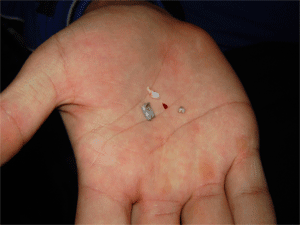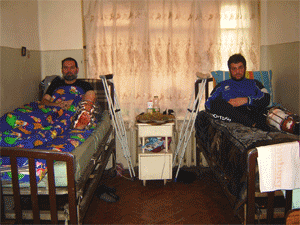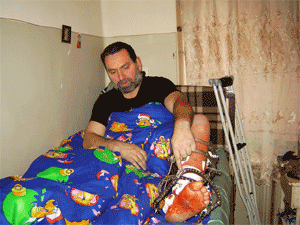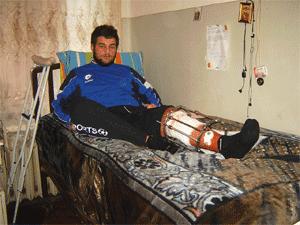Vakhtang Inasaridze and Nika Didishvili have been treating at Tbilisi Hospital # 1 for 48 days already. Exactly 49 days have passed since November 7, the day when officially announced rubber bullets but in fact the wounds from unidentified gun, has put those men in the hospital. The dispersal is still much spoken about, however during election campaign politicians seem to have forgotten that many people have become victims of November 7. These people are recalling what they have personally witnessed on that day.
***

 There is much crowd in the narrow ward. There are two beds in the corners at the window just opposite the door. Completely strange people have become friends as a result of common misfortune. They even resemble each other. Both have beard and they have their legs bandaged…They celebrated their birthdays at hospital…Mr. Vakhtang celebrated his 45th birthday and Nikusha has become only 19.
There is much crowd in the narrow ward. There are two beds in the corners at the window just opposite the door. Completely strange people have become friends as a result of common misfortune. They even resemble each other. Both have beard and they have their legs bandaged…They celebrated their birthdays at hospital…Mr. Vakhtang celebrated his 45th birthday and Nikusha has become only 19.
The men are not very much keen on speaking about November 7. It is really difficult to recall how military units and policemen, quite often praised by governmental officials, were dispersing peaceful demonstrators.
Vakhtang was supporting demonstrators from the very beginning. He attended demonstrations everyday except November 6. On November 7 he was in Rustavi and was planning to stay there until late. However he suddenly decided to return to Tbilisi because his daughter was not answering phone calls and he got worried.
“TV set was on. I knew what was going on in front of the Parliament building. My daughter was not answering my calls and I got afraid. I doubted she was at the demonstration. The pictures I saw on TV were terrifying. I decided to go to Rike (place near the River Mtkvari embankment in Tbilisi).”
Vakhtang Inasaridze recalls the situation which he witnessed having arrived at Rike. “People were telling how they had been beaten; stepped down by riot policemen. Protestors had not made any provocative statements, as public officials claimed.”
Demonstration on Rustaveli Avenue had been already dispersed. Another operation was expected to start on Rike too. Despite that it was a surprise when protestors saw policemen and soldiers there.
“Suddenly I noticed that “Robocops” with truncheons, policemen in yellow raincoats, elite military units, soldiers in jeans are running from the bridge in a sport and refined manner. They seemed to be well-trained. I was looking at them and thought enemy was approaching us.”
It was not an organized introduction of the army; it was rushing into the crowd of people. They were ordered to punish and harass people. They were inspired with hatred.
People were confused and afraid. We were running up the Wine Rise. Many of us could not find a road out and stopped at the small mounting under the Queen Darejani Palace. Screaming, shouting and crying were heard…”
This man is not nervous while speaking. He is recalling the facts in consecutive order. However all his words or pause reflects the emotion that gave start to the events of November 7…
“People were confused. They were trying to survive. Demonstrators resisted the first attack of the militants. They had not other choice; they could not surrender because it might end into crush. The enemy was defeated by joint effort. Government should not think that they have won over the people. Even if they had broken my both legs, I should have definitely been proud because I was there. I felt both pain and pride together. They got afraid of people and retreated. Militants were scolding and destroying everything on their way back. Later they returned with weapon and started to shoot at people.
Consequently people got panicked. They run up the Wine Rise. We saw tracers from the direction of Metekhi Church; they were shooting from fires-guns. When they started shooting I had not reached the Wine Rise yet. I was looking in the direction soldiers were coming. They were moving in groups and were shooting at us.
When I was wounded the first thing I thought was to escape from the place. I was wounded in the leg but I was not afraid of death, I did not want to be insulted, which was likely to happen if I had remained on the place. I was helpless. I cried out several times and strange boys ran up to me in rescue. Both my leg-bones were broken. The bullet had broken one bone and then it broke another too. X-ray picture can show it. So some people are lying when claiming that it was a simple injury. The boys were dragging me up the Rise. I felt terrible pain but suddenly I guessed that another attack was starting from below because my rescuers were running faster. I leaned on their shoulders being afraid they would leave me on the place.
Suddenly I heard “Buys help us we are carrying a wounded man,” but there was answer “No we can’t we are also carrying a wounded boy.” I looked forward and saw they were holding Nika.”
It was first time when Vakhtang and Nika met each other. Inasaridze thinks that now that strange boy has become the closest person for him, the person who understands him best of all…
***

 Nineteen-year-old Nika Didishvili is not so keen on speaks. He happened to be on Rike on November 7 quite by accident. He went across the Baratashvili Bridge after he had seen his aunt to her house next to the City Hall building.
Nineteen-year-old Nika Didishvili is not so keen on speaks. He happened to be on Rike on November 7 quite by accident. He went across the Baratashvili Bridge after he had seen his aunt to her house next to the City Hall building.
“The traffic was heavy. I walked from Baratashvili Bridge to the City Hall because mini-buses were not running at all. I was about to take a taxi at the Embankment (very close to Rike place) to get home. Rustaveli Avenue was overcrowded. Riot policemen, water cannon trucks, fire trucks and jeeps with acoustic weapons were in the avenue.”
A lot of people were standing there. Nika thought that everybody was there to have a little rest. Many people felt bad; they seemed to have inhaled gas.
“People on the Baratashvili Bridge said that militants would not go down on the Rike. Suddenly everybody got panicked. We heard shooting. There was smoke in the air. Everybody was screaming, running and people were beaten. It had no sense to run up the Wine Rise. There were a lot of people there. If somebody fell down s/he would have been stepped down.”
Nika said the people managed to resist the first attack of militants. Next time policemen in yellow raincoats and soldiers started to attack from the Metekhi Bridge.
“People were escaping soldiers who were moving along Baratashvili Bridge. I followed the crowd of people because I could not resist them. Soon I was close to Metekhi Bridge and ran towards the Wine Rise. Suddenly something exploded behind and threw me 4-5 meters away. I do not remember how I fell down. I remember I was standing on my one leg and was trying to stretch my left leg. Both my legs were aching. It did not happen by mistake; almost every wounded was shot in the leg. My leg-bone was broken, muscle was badly damaged. If they had shot at me a bit higher, I would not have survived.”
“When I was wounded I started crying so loudly that people running in front of me turned back and carried me to the Wine Rise. I felt how difficult it was for them to carry me. Riot policemen were following us. Suddenly I remained alone; people got afraid but only one person who was not leaving me. I leaned on him and went on together. My rescuer was crying for help and soon strangers ran up to us. We stopped at the Wine Rise. The street is narrow and difficult to go along it. I told others to leave me alone; I could go up the street on my own. However, that man was not abandoning me. We were calling for ambulance but it was nowhere.”
“I did not lose conscious and felt how I was bleeding. Luckily a car was moving from below the street and the driver helped me very much. Mr. Vakhtangi was being carried behind me and he was placed in another car.”
“I felt safe in the car. Riot policemen were far away but legs were terribly aching.”
***
That is the story how Vakhtang Inasaridze and Nika Didishvili met each other in Aramiantsi hospital. Relatives and friends of injured people knew nothing about their trouble. However, doctors were very attentive to them. Particularly caring was Doctor Simon Darakhvelidze.
One more boy was placed in the hospital. He was badly injured too. He had already lost two liters of blood. He has been discharged from hospital for two weeks already. The wounded person and his relatives cannot understand why he was discharged. Doctors wanted to do the same about Didishvili and Inasaridze but they categorically demanded to remain in the hospital. They preferred to stay together because they get on with each other very well. It is kind of psychological support.
The government claims that law enforcers used only rubber bullets on November 7. The photos of the wounded people cast doubt on their statements.
A nurse from “Aramiantsi” Hospital recalls how bad was Nika Didishvili’s health conditions when he was brought to the hospital.
“Soft tissue was burnt down to the bone. So we used narcosis on the wound. There was such a hole on the leg while working out the wound that the doctor used lantern when operating on to bring muscles together. We made situation stitches on his wound. The patient still needs bandages.”
There were relatives in the ward. Although they have not witnessed the incidents of November 7 nobody wants to recall it. Mother of Nika Didishvili said that she is sorry she was not at the demonstration on that day. The woman recalled how she learned about the incident of her son.
“At 6:00 PM I was watching news program. I got worried. I called Nika but his mobile hone was cut off. I called my husband. He seemed confused when speaking with me. I felt my husband was lying something. I told him I was coming to his office and warned him to bring Nika there until my arrival.”
“I called my husband again when I was closed to the embankment and told him that streets were blocked and asked him to tell me the truth where to go exactly. Finally he advised to go to “Aramiantsi” hospital; our son was there. The time prolonged like one century until I reached the hospital. Entering the ward I saw Nika was not injured above the waist. I did not want to pull aside the blanket, I was afraid he had lost his legs.”
These people have very painful memories. The Government tries to hash the incidents of November 7 under the carpet. Representatives of the Ministry of Health Care state that they have reimbursed expenses for medical treatment; they had paid five thousand lari for each injured person. However, relatives say that besides that money they have to pay much more for painkillers; the medicines at hospital are not efficient enough and do not kill pain. Thus relatives have to buy more expensive medicines. In addition to that damaged people say that representatives of the Ministry treated them in degrading manner”.
An official from the ministry visited Didishvili and Inasaridze several weeks after the accident. He did not even enter the room. He was speaking with patients from the door. Injured people could not understand why that person could not dare to enter the ward.
Nika Didishvili: “We were two wounded men here. How could we do any harm to him? He just inquired about our health conditions. He said he was sending messages by phone to the Minister of Health Care and was informing him about our health conditions. He even show the messages on his mobile phone”
It is interesting what kind of democracy envisages informing governmental officials about the health conditions of damaged people by phone-messages. It is apparently the know-how of our government.
Neither higher ranking officials got much interested in the conditions of these people. A riot policeman was treated in the same hospital one floor above Didishvili and Inasaridze’s ward. Nino Burdjanadze, the chairwoman of the Georgian Parliament, visited the policeman on the next day. She did not consider it was necessary to visit the injured men one floor below. Only next day she sent her security guard to see them. Nika’s story about the visit is the following:
“They came and said Mrs. Nino wanted to meet us. They warned us against being rude and critical in our conversation with her. We got furious about it. We had been wounded a day before and were in terrible situation. At that very moment they tell us to keep silence and to thank Burjanadze for our survival. They beat us, degraded us, we survived with the support of Georgian people and after all that should we thank Nino Burjanadze for everything what happened? We were furious and felt ourselves insulted by their visit.”
Nevertheless, officials from the Prosecutor’s Office visited the wounded people very soon. It was 7:00 PM when they rushed into the ward without asking permission. They produced their Ids and interrogated the wounded people. None of them inquired about their health conditions.
Vakhtangi agreed to answer their question but Nika preferred to enjoy his right of silence since he thought he was a victim. But law enforcers neglected his refusal because they considered him to be a witness and Nika was obliged to answer their questions.
Julie Beria: “Then I told law enforcers I would call attorneys. The prosecutor told me that if the attorney had not come in one hour, they would have interrogated my son. I had no way out, I called Goga Khaindrava and twenty minutes later attorneys arrived at the hospital”.
Nona Suvariani, Tbilisi



